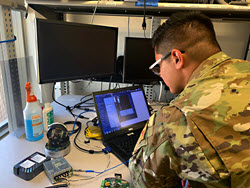Story by Master Sgt. Michael Leslie
Texas Joint Counterdrug Task Force
 Texas National Guard Joint Counterdrug Task Force communications support member, Staff Sgt. Daniel Pando, works on cutting-edge electronic equipment to support the Homeland Security Investigations Technical Operations Unit catch drug trafficking organizations in El Paso, Texas. Texas Counterdrug has supported federal, state and local law enforcement throughout the state for more than 30 years in the war on drugs.
Texas National Guard Joint Counterdrug Task Force communications support member, Staff Sgt. Daniel Pando, works on cutting-edge electronic equipment to support the Homeland Security Investigations Technical Operations Unit catch drug trafficking organizations in El Paso, Texas. Texas Counterdrug has supported federal, state and local law enforcement throughout the state for more than 30 years in the war on drugs.
EL PASO, Texas – In a world where technological advances have become a part of many people’s everyday life, these Texas National Guard Joint Counterdrug Task Force members must ensure they are ahead of the game, or they will fall behind to the drug trafficking organizations they are trying to help dismantle.
For the past four years, Texas Counterdrug has supported the Technical Operations Unit of Homeland Security Investigations in El Paso and its contribution has paid high dividends.
“The Technical Operations Unit provides HSI components with the most innovative, cutting-edge electronic surveillance equipment and support in furtherance of criminal investigations and national security operations,” said HSI El Paso Group Supervisor Efren Aguilera, who oversees Tech Ops.
The support that Texas Counterdrug members, Army Staff Sgt. Jose Pena and Air Staff Sgt. Daniel Pando, provide for the Tech Ops Unit has no limits.
“They assist with the everyday functions of the Tech Shop that includes fabricating enclosures, function testing and issuing electronic equipment to special agents,” said Aguilera. “They support the office with radio operability functions and assist with surveillance operations. In a nutshell, they provide a wide spectrum of support.”
When Pena and Pando were assigned to the group 3 1/2 and 2 1/2 years ago respectively, they had interest in the mission but were not fully capable – yet.
“The way we were able to learn and become more proficient of the job was due to on-the-job training and exposure to the experience Technical Enforcement Officers have,” said Pena. “We had plenty of hands-on training.”
Now, Pena and Pando are providing essential instruction to agents on proper deployment, use and exploitation of various pieces of covert technical surveillance equipment.
“We pass on our experience to others by informing agents how to utilize equipment properly for their operations,” said Pena. “We also assist them in making key decisions on what specific device is the most adequate pertaining to the related case and environment.”
How they accomplish this support is even more intriguing.
“We have, several times, designed, fabricated and constructed fully customized enclosures utilizing various combinations of Plexiglas, fiberglass, metal, wood, 3D printed parts, customized decals, and paint to fully conceal,” said Pena. “All fabrications and constructions met and exceeded specifications for temperature and humidity.”
The Texas Counterdrug support not only provides HSI with additional technical support, but it allows for licensed HSI officers to return to the operational field.
“They're a force multiplier,” said Aguilera. “HSI El Paso is an extremely busy office and having National Guard support the Tech Ops Unit is a huge benefit. The Tech shop is a small unit with a big mission, so having Pena and Pando as part of the team, has been a relief.”
As an Air Force veteran, Aguilera knows what the service members bring to Tech Ops and beyond.
“In my experience, you can always count on National Guard personnel getting the job done in a timely manner and with minimal guidance,” said Aguilera. “The mission is in a better place with the partnership fostered with the National Guard, not only for Tech Ops, but for the other HSI programmatic areas for which they offer support.”
Tech Ops and Counterdrug must always improve; thinking outside the box to build new products and how they can implement them.
“They are hardworking task force members who go above and beyond, learning new ways to create new products to put in new devices,” said Sgt. 1st Class Gilberto Urbina, a Texas Counterdrug assistant team leader.
These capabilities support HSI, but also several law enforcement agencies in their area ranging from Deming, New Mexico, and reaching far into the Texas plains. They also provide support for nationwide cases.
“Our capabilities within Tech Ops would include support to the whole HSI El Paso area of responsibility with specialty technical equipment for HSI cases,” said Pando. “As well, we assist Border Patrol and the Texas Department of Public Safety with equipment.”
The task force members are not content where they are now, Pena and Pando want to keep training and moving forward to support HSI even more.
“We want more advanced training that benefits the members,” said Urbina. “For example, we’d like high-voltage training and media exploitation devices.”
Law enforcement agencies throughout the state have witnessed the expertise, commitment and dedication that the Counterdrug task force members have brought to their offices for more than 30 years.
“I respect the professionalism of the National Guard personnel,” said Aguilera. “I look forward to the continued partnership with Counterdrug.”
It is clear that the HSI Tech Ops Unit is one of the best in the country and Staff Sergeants Pena and Pando have had a crucial role in that success.
“Nationwide, HSI El Paso consistently ranks among the top in overall enforcement statistics,” said Aguilera. “These are the successes we share with our partner agencies to include the National Guard.”